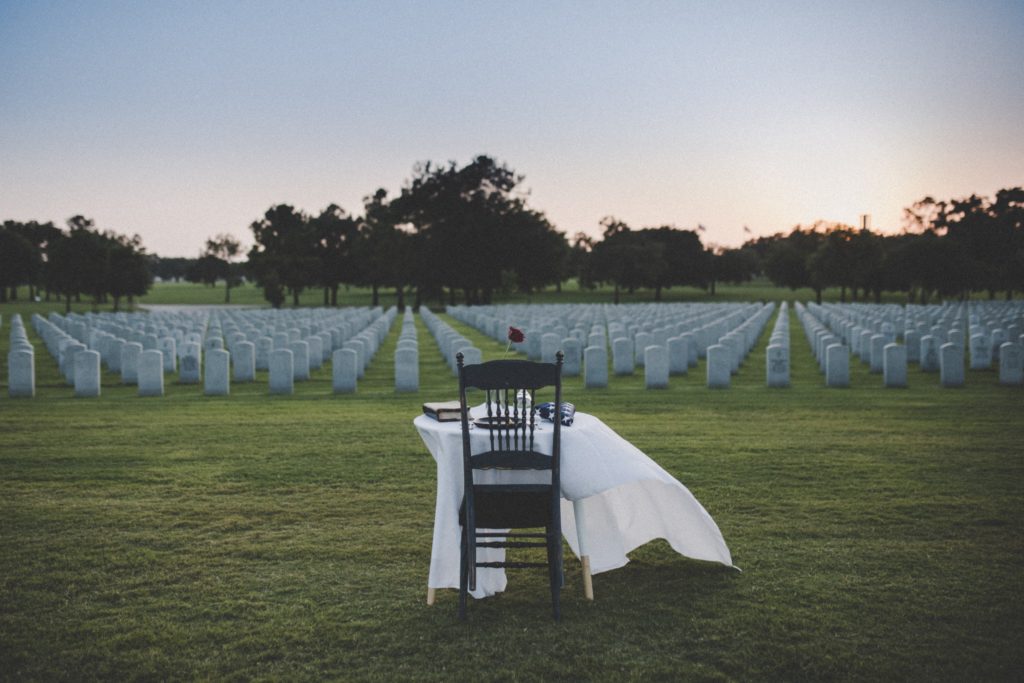
In the US, today is Memorial Day, the day when we remember those who have given “the last full measure of devotion,” who have died in the military service of our country. In an odd way, it’s a reminder of both the brokenness of our world—the ongoing frequency of war and the toll it takes on entire generations of families who have lost loved ones either to death or to deep psychological scars—and the pervasiveness of the image of God, reflected in the courage and self-sacrifice of those who serve.
There’s no more Christ-like action than to offer your life for those you love (Jn 15.13). I suppose no soldier actually intends to sacrifice his life; to paraphrase General George Patton, you win not so much by dying for your country as by making the other guy die for his country. That doesn’t lessen the significance of their sacrifice; every soldier is prepared to make that sacrifice, even as he takes steps to minimize the likelihood that he’ll have to.
Some of those who died never saw it coming and felt no pain in that moment. Others, however, made a deliberate choice to die in order to save their buddies, some by falling on a grenade, others in other ways. In that last moment, they were well past the point of “taking a risk”; they acted intentionally to give their lives for those they loved.
I have known men who saw such things—men who were the loved ones for whom others intentionally took the proverbial—or not at all proverbial—bullet. Most of them never, or almost never, talked about it. These were strong men, the Greatest Generation, tough and hard, but not hard enough, not tough enough, to hold back tears when they spoke of such things.
They came back, carrying heavy invisible loads of survivors’ guilt, and they paid private visits to the families of those who had died, and the ones I knew lived the rest of their lives in the memories of their heroes, their saviors. Indeed, living their lives, the lives paid for with the lifeblood of their friends, was the only chance they had to make some sort of repayment.
And live they did. They raised families, they worked hard, they formed the backbone of the greatest nation of all time. In the main, the defects of that nation today—and there are many—cannot be laid at their feet. They lived well, honoring the sacrifices of their unimaginably brave and devoted buddies.
And some of them, those who were able, have stood at the graves of their friends, heads bowed, deep in grief, wishing for a chance, just a moment, to speak one more time with their savior, to express their gratitude, to tell him about the life they’ve lived and the good they’ve done and the joys they’ve seen, to assure him that they’ve tried to make his sacrifice Worth It. And to say, through tears, how much they wish that he could have experienced those things with them.
We stand in their shoes.
Someone has died for us as well.
He did see it coming, for all eternity, and he planned it himself as the just means of justifying, not his friends, but those who hated him without reason and by their own choice.
It was not painless. Indeed, the form of his death may well have been the most painful ever devised, and the most shameful as well.
How shall we then live?
We don’t need to stand by his grave and weep, because there is no grave, because there is no body. Unlike our honored dead, this Savior emerged from his grave, taking death by the throat and squeezing every bit of power and authority out of it, crushing the serpent’s head.
He is not there. He is risen. As. He. Said.
How shall we then live?
To the fullest. In honor of his sacrifice, in eternal service to him. This do in remembrance.
Photo by Selena Morar on Unsplash

Alice says
Wow and thank you…